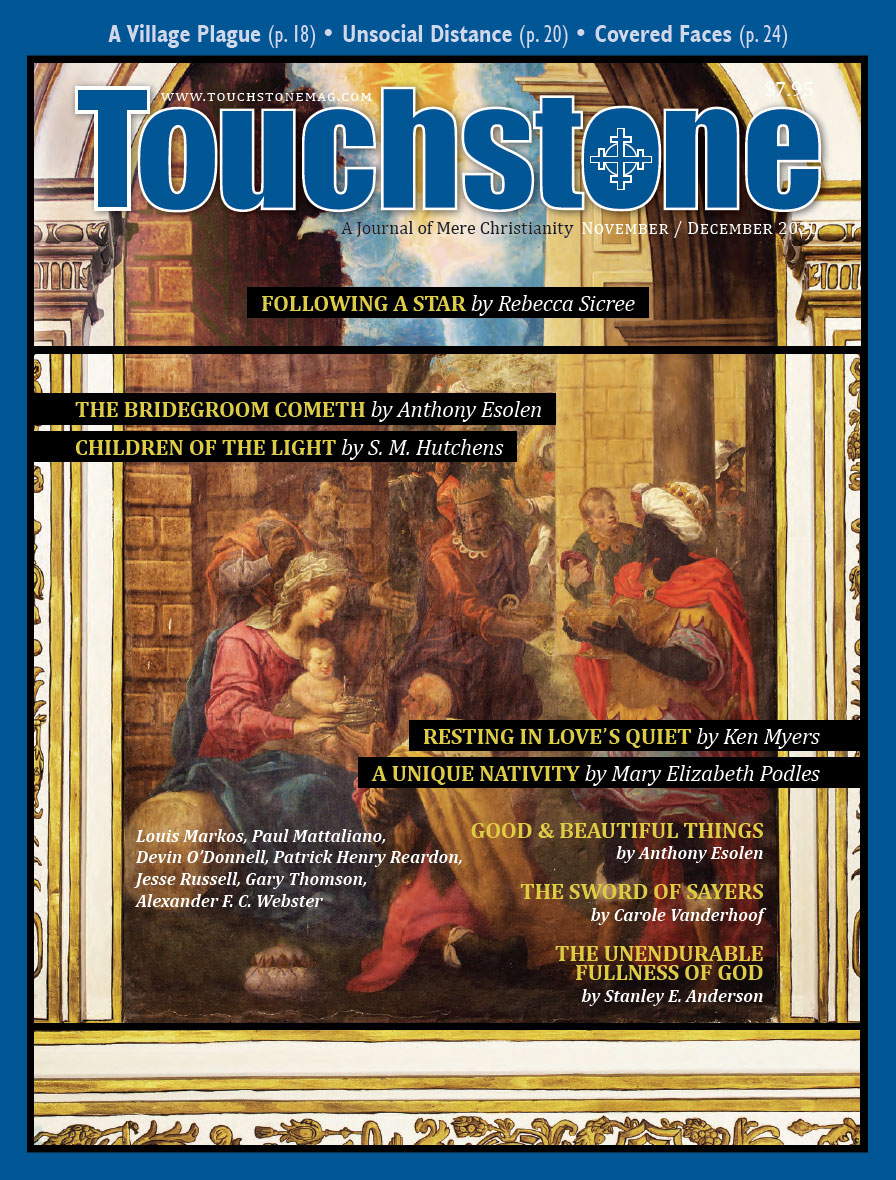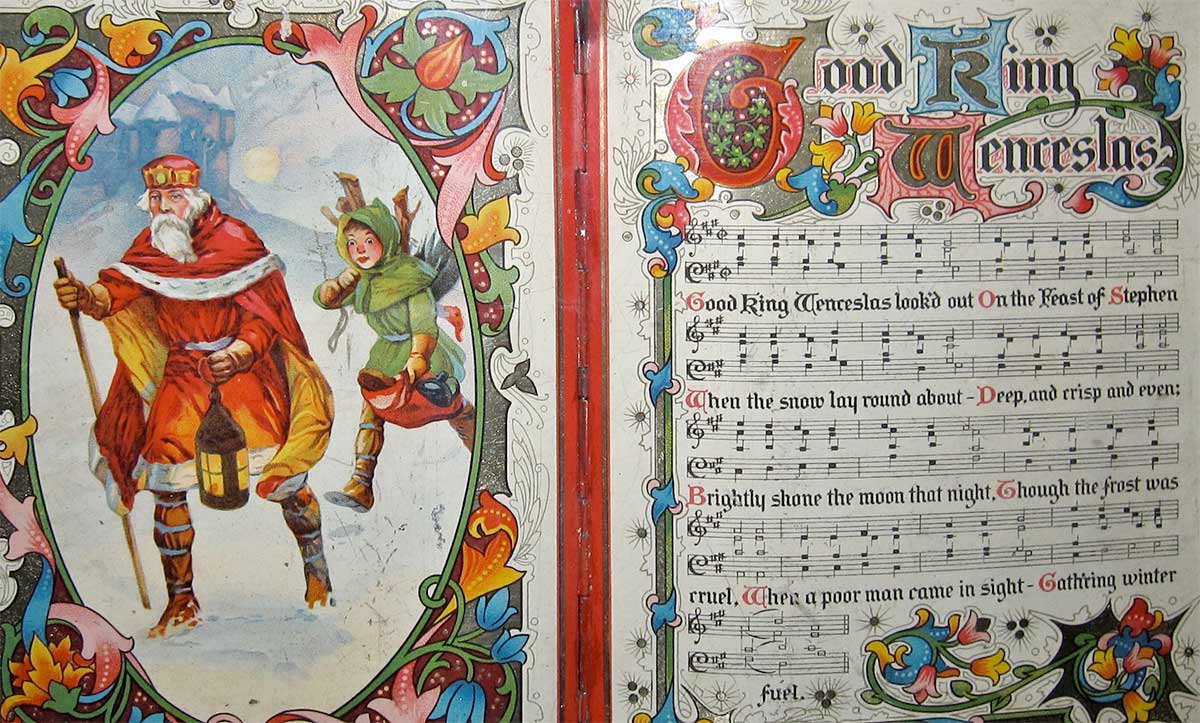Book Review
The Order of Loves
The Virtue of Nationalism by Yoram Hazony
"Going therefore, teach ye all nations; baptizing them in the name of the Father, and of the Son, and of the Holy Ghost." (Matt. 28:19)
Terrence Malick is one of the few contemporary Christian filmmakers who combines a sincere (if, at times, apparently unorthodox) faith with tremendous creative ability. His most recent film, A Hidden Life (2019), tells the story of Blessed Franz Jägerstätter, an Austrian farmer who was martyred for refusing to swear the oath to Hitler required by the Wehrmacht, into which he was conscripted. As he holds fast to his loyalty to the Christ of compassion and mercy above the mad and cruel Caesar ruling the Third Reich, the courageous and pious Franz is forced to endure incredible physical and mental torture and, finally, a gruesome death under a guillotine.
Malick's film is a tour de force that explores the nature of good and evil and the meaning of human suffering and love, mainly through a Christian theological lens. But among its central themes is the question of patriotism, or what, since the 2016 election, increasingly has been called "nationalism." Franz, exquisitely played by German actor August Diehl, is a lover of his village of Sankt Radegund, nestled in the Alpine foothills of Upper Austria, and his wife affectionately calls it "our village." Franz seems to be an Austrian patriot as well—his father had, in fact, died while serving for Austria in the First World War.
At the same time, however, Franz objects to the German-Austrian effort to conquer much of Europe. In one exquisite and pointedly theological scene, set amid the tall grass surrounding a hilltop church, he tells his pastor that those who are defending their homeland against German aggression are the true heroes. Imperial conquest, genocide, and euthanasia are, Franz believes, in direct contradiction to the Christian just war tradition, and resistance to the ambitions of the Nazi regime is a moral imperative.
The humble and parochial nationalism of A Hidden Life's Franz Jägerstätter echoes, at least on one level, Yoram Hazony's clarion call for a return to an anti-imperial nationalism in The Virtue of Nationalism, one of the most important theo-political books of the last ten years. But on another level, Hazony's vision is hindered by his misreading of the essentially "universalist" character of Christianity, by his failure to grasp the importance of grace and charity in Christian thought, and by his apparent ignorance of the eschatological perspective that ultimately undergirds the Christian political vision.
A Natural Phenomenon
In The Virtue of Nationalism, Hazony, an Israeli biblical scholar, argues that, rather than being a vessel of hatred and chauvinism, nationalism is an entirely natural phenomenon that allows for a multi-polar, ethnically diverse, and tolerant world. It is the outgrowth of what he calls a "four-tier hierarchy," which proceeds from family to clan to tribe to nation. The concept of the nation branching out from the family leads people to see their own country as a sort of extension of the family, such that their individual interests are tied to the collective interests and good of their country.
As part of his historical narrative of the emergence of nationalism, Hazony covers its early incarnations in ancient Greece and the city-states of northern Italy, as well as contemporary Asian examples, such as India, Japan, and South Korea. But he ultimately finds the roots of his vision of the nation in the Old Testament, with its example of the Hebrews as a nation of brothers under the rule of a king drawn from the people. To counter allegations of racism, he notes that the ancient Hebrews were able to accept and incorporate members of other tribes into their nation, as long as they adhered to the culture and customs of the Hebrews.
According to Hazony, nationalism in the West is largely a positive "Protestant" phenomenon that grew out of the theological and political efforts of northern European countries to break free from the German imperial and Catholic ecclesiastical dominance of the Middle Ages. For him, the primary obstacles to "positive" nationalism—and the true sources of hatred, ethnic chauvinism, and genocide—are imperialism and universalist movements, which he regards as essentially totalitarian.
Obstacles to Nationalism
In the West, Hazony argues, imperialism has principally taken the form of a "German empire," which has stretched across time from the First Reich of the German Holy Roman Empire (c. 800–1806), to the rule of Kaiser Wilhelm II (1888–1918), to Nazi Germany (1933–1945), and finally to a "Fourth Reich" of the European Union, which was endorsed by post-World War II German leaders like Konrad Adenauer. Hazony even includes Kant's desire for global governance in Perpetual Peace as being an extension of German will to power and universalist ambitions.
This historical analysis of Germany's perpetual desire for global dominance may be debatable, but Hazony's critiques of other "universalist" ideologies, such as Islam, Marxism, and, perhaps surprisingly, liberalism, are largely correct. Certainly, conservatives generally regard Islam and Marxism as essentially totalitarian ideologies, but, in a novel addition that is only possible in the postmillennial world, Hazony argues that liberalism, too, is a totalitarian system.
Citing George H. W. Bush's post-Cold War "new world order," Hazony sees liberalism as essentially imperialistic and totalitarian—especially its left-wing variant. Other contemporary advocates of a naïve universalism, for him, include Francis Fukuyama, -Thomas Friedman, and Shimon Peres. Their vision of global governance under a liberal hegemony will not bring peace, he argues. On the contrary, only a nationalism that results from "collective self-determinism" and that upholds limited government and public, biblical religion, will enable a balance of power among nations that will ensure peace and prosperity.
Hazony also argues that each nation not only must have a unique cultural identity and political sphere of influence, but also must pursue "the truth according to its own understanding." It is this apparent "soft relativism" that is the Achilles' heel of his argument. For despite his strong case for national identity and independence and against totalitarian movements, he seriously misreads Christianity.
Hazony's distinct distaste for universalist movements extends to Christianity, which he especially dislikes because, in his view, it seeks to impose norms on a global scale and, like Islam, it divides the people of the world into believers and nonbelievers.
He is not completely wrong about this. Christianity is fundamentally a universalist movement that desires to spread its message to the entire globe and to unite believers into a community. But Hazony fails to grasp the true nature of Christianity's universalist message and the essence of the Christian understanding of patriotism.
Piety & Rightly Ordered Love
For Christians, nationalism is not necessarily a virtue, but piety is, including piety with respect to one's country.
In the Summa Theologiae, St. Thomas Aquinas outlines the virtue of piety. Because humans owe a debt to their parents and kinfolk, he explains, they are obligated to give "worship" to their parents and country, and this "worship"—or, better translated, "reverence"—is to be extended to "all our kindred, since our kinsfolk are those who descend from the same parents." Moreover, the "worship given to our country includes homage to all our fellow-citizens and to all the friends of our country" (II-II:101).
But loyalty to God must take precedence over loyalty to one's countrymen (a point with which Hazony would presumably agree). Aquinas notes that "if the worship of one's parents takes one away from the worship of God, it would no longer be an act of piety to pay worship to one's parents to the prejudice of God." Hence, Christians do owe loyalty to their families and to Caesar, but loyalty to God, to his teaching and his holy will, comes first.
Moreover, there is a fundamental bond between all authentic Christians that is forged by what Aquinas, drawing from St. Paul, describes as the virtue of charity. At the same time, Aquinas argues, drawing here from St. Augustine, there is an "order" to charity that takes into account the relative importance of family, tribe, and country. In the Summa, he treats charity as being fundamentally "the friendship of man for God" (II-II:23). God is to be loved above all. After that, one must love those to whom one is closest, and "the affection of our charity" should "be more intense towards those to whom we ought to behave with greater kindness." This closer bond of charity extends to those of the "household of faith," Aquinas explains, for "out of charity, we should wish a greater good to one who is nearer to God."
Next, according to Aquinas, we owe charity to those who are "connected with us by their natural origin." Indeed, the love of someone
because he is akin or connected with us, or because he is a fellow-countryman or for any like reason that is referable to the end of charity, can be commanded by charity, so that, out of charity both eliciting and commanding, we love in more ways those who are more nearly connected to us.
Aquinas further argues that "we ought out of charity to love those who are more closely united to us more, both because our love for them is more intense, and because there are more reasons for loving them."
Thus, true Christian charity does not negate but rather perfects the natural bonds between persons that Yoram Hazony outlines in The Virtue of Nationalism. On one level, a person does not give up being a member of a family, tribe, or nation because he or she is a Christian. But the bonds of charity between Christians and Christ and with one another are vastly superior to the bonds of blood, culture, and citizenship. As Christ says in the Gospel of Matthew: "Whosoever shall do the will of my Father that is in heaven, he is my brother, and sister, and mother" (12:50).
The bonds of charity between Christians form them into citizens of the City of God who are journeying toward their heavenly homeland. The true home for the Christian is in heaven, and true brotherhood subsists among those who are in full communion with the Church and united in true charity with each other in obedience to the will of the Heavenly Father.
Universal Truth
This is one of the key pieces missing from Hazony's argument. His desire for a peaceful and just world order is noble and honest. There is little doubt that Hazony has a keen moral sense and is working for a just and peaceable world order for the benefit of all. But his critique of Christianity is deficient and reveals the limits of his own all-too-secular (albeit biblically informed) vision.
Certainly, for Christians, nationalism in the form of piety is a virtue. At the same time, Christians believe in a universal truth, and, inspired by charity, desire all men and women to be saved. This desire spurs their efforts to evangelize the world through word and example.
There are, of course, unique cultures and traditions that should be preserved, respected, and allowed to flourish, and no people should be made to suffer under the totalitarian yoke of a despotic ideology. However, there is one Lord Jesus Christ, "the way, the truth, and the life," who invites everyone into his Church and desires the salvation of all.
subscription options
Order
Print/Online Subscription

Get six issues (one year) of Touchstone PLUS full online access including pdf downloads for only $39.95. That's only $3.34 per month!
Order
Online Only
Subscription

Get a one-year full-access subscription to the Touchstone online archives for only $19.95. That's only $1.66 per month!
bulk subscriptions
Order Touchstone subscriptions in bulk and save $10 per sub! Each subscription includes 6 issues of Touchstone plus full online access to touchstonemag.com—including archives, videos, and pdf downloads of recent issues for only $29.95 each! Great for churches or study groups.
Transactions will be processed on a secure server.
more from the online archives
calling all readers
Please Donate
"There are magazines worth reading but few worth saving . . . Touchstone is just such a magazine."
—Alice von Hildebrand
"Here we do not concede one square millimeter of territory to falsehood, folly, contemporary sentimentality, or fashion. We speak the truth, and let God be our judge. . . . Touchstone is the one committedly Christian conservative journal."
—Anthony Esolen, Touchstone senior editor










